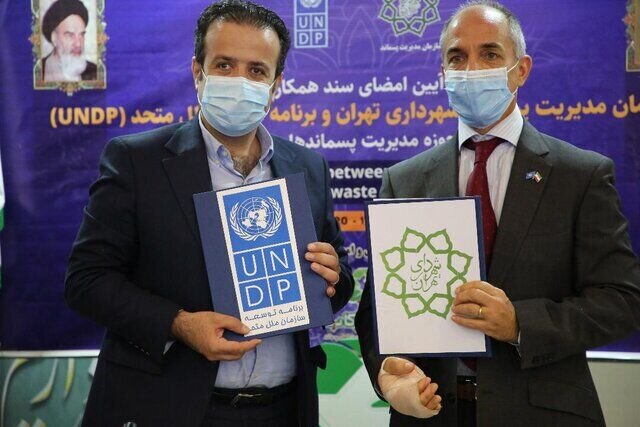UNDP, Tehran Municipality to enhance waste management co-op

TEHRAN – Tehran Municipality inked a memorandum of understanding (MOU) with the United Nations Development Program (UNDP) to enhance cooperation on waste management.
The MOU was signed between Sadr-o-din Alipour, head of Waste Management Organization of Tehran Municipality, and Claudio Providas, UNDP Resident Representative in Iran, during a meeting on Wednesday in Tehran.
International organizations should pay attention to Iran's special circumstances due to sanctions and pressures that often cause great harm to the people, Alipour said, adding that international law, even in times of war, addresses environmental issues, including air pollution and soil and water resources, separately from all other issues and without all restrictions.
“Despite all the pressures, we have defined projects that require the economic capacity, technology, and experience of other countries to implement,” he stated.
Providas, for his part, said that UNDP is one of the executive arms of the United Nations and can prevent wasting time and money by collaborating on urban projects.
“We have provided Oceania and Asia with rules on how to transport hazardous and contaminated waste and plastic. The outbreak of the coronavirus also brought up many challenges and opportunities in the field of waste, which we took action on,” he noted.
UNDP's office can best share global experiences with Tehran Municipality and in cooperation with UNICEF and the World Health Organization, all of behavior change patterns can be shared, he stated, adding, collaborations can even expand in the field of electronic waste management.
Tehran has very good capacities in the field of waste management and these potentials can be used for creativity and innovation. In this regard, it is a pleasure to be able to transfer our experiences and knowledge to Iran, he concluded.
Waste management in Iran
Poor waste management brings the country an annual loss of 440 trillion rials (about $10.5 billion), Hassan Pasandideh, head of waste management affairs at the Department of Environment (DOE), has said.
Meanwhile, over 3,000 tons of plastic waste is generated per day in the country, which reaches 1 million tons in a year.
Ali Moridi, head of soil and water office at the DOE, said in October 2018 that while reduction of waste generation and separation of waste at source are the two major processes in waste management, in Iran the focus is mainly on the last phase of waste management which is waste disposal, which will slow down the path to waste minimization and waste sorting at source.
Although proper waste management could solve the country's environmental problems, the budget requested by the DOE for waste management has not been approved by the Majlis [Iranian parliament], he lamented.
According to a report published by United Nations Industrial Development Organization (UNIDO) in October 2016, waste generation per capita in Iran’s urban areas is about 658 grams per day while Iranian waste generation per capita in rural areas is about 220-340 grams per day. Average Iranian waste generation per capita amounts to some 240 kilograms per year.
In Tehran alone waste generation per capita is estimated at 750-800 grams per day and each Tehrani citizen generates about 270-450 kilograms of waste per year.
The report continues that unfortunately only 7 percent of the waste is separated at the source, 13 percent is recycled and only 2.5 percent of them end up in formal or sanitary landfills, and some 77.5 percent of the waste will be burnt or buried in informal landfills located in the countryside or deserts near cities.
FB/MG

Leave a Comment